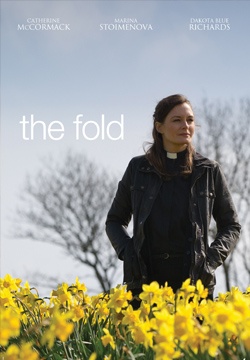
Champion rhythmic gymnasts do not make natural actresses. This I learnt watching THE FOLD, which features Bulgarian Marina Stoimenova as a troubled daffodil picker, Radka, who has difficulties with boys. This independently-produced, handsomely photographed British film, written by Poppy Cogan and directed by John Jencks, stars Catherine McCormack as Rebecca Ashton, an Anglican priest who moves to the Cornish coast in response to the death of her daughter, Alice (Kate Hollowood) who we first see face up in the bottom of a swimming pool – we are led to believe it was suicide. Given the visual association of water and female sexuality (TOP OF THE LAKE, SWIMMING POOL), the suggestion is that reconciling her sexual desire to reality was too much for the young girl, though of course it could have just as easily been drugs. Rebecca, of course, blames herself, not in so many words, but she felt she let her daughter down. How can she have mother-daughter talks about boys with that dog collar? Wait until your wedding night? Life does not work like that. So she has a need to make amends, a need filled by Radka, whom she discovers sleeping in her new church. Radka barges past without picking up her stuff. Rebecca sees from the notebook handily left behind that she has some artistic ability – she’s got potential. Volunteering at the local community centre, where she throws herself into paperwork, Rebecca discovers that Radka has problems with English, not speaking but writing. That’s where she can help.
Rebecca has another daughter, Eloise (Dakota Blue Richards) who is quite musical. Early on, she has an argument with her mother over Scrabble. She wants to play the word, ‘Minging’, meaning a girl of loose sexual morals. ‘If it’s not in the Oxford English Dictionary, you can’t have it,’ says Rebecca reproachfully, ‘Ashton family rules.’ Eloise recalls how Alice always won at Scrabble. Ouch! Eloise plays ‘ringing’ instead.
Radka has a desperate need to be loved, but is on the Glenn Close-FATAL ATTRACTION scale of emotional dependency. The English lessons begin, but then she misses a class. A boy doesn’t want her to attend, presumably because he is worried that she’ll expose his educational shortcomings. There is a fight, not as bad as the incident involving a knife, but bad enough. Rebecca wants to work around this and lets Radka off her homework.
The dead daughter is the elephant in the room. Rebecca’s husband, Edward (Owen Teale) turns up on the one year anniversary of Alice’s death. They should do something. Why not a picnic? Afterwards, Rebecca feels very lusty and takes control in the bedroom. Owen Teale might have been someone in GAME OF THRONES but he’s no match for his Viking wife. Radka sees Rebecca and Edward in a moment of intimacy.
Eloise starts sneaking off to listen to some Eastern European musicians – the daffodil pickers don’t talk, they play music instead. She is attracted to the tall blond violinist (Jakub Gierszal) – who wouldn’t. When her mother asks where she’s going, she replies, ‘to see friends! You don’t know them.’ Clearly not Anglicans!
Radka spends the night on the floor of the church and asks Rebecca to lie down next to her. They fall asleep. But then one of the parishioners sees them. Shock, horror, commercial break!
Rebecca is told at the local centre for bored teenagers that she cannot Eloise anymore. But she is innocent. Radka takes her exam.
In the dramatic conclusion – relatively speaking – Radka goes to Rebecca’s house and sees Eloise. ‘You told me your daughter was dead.’ ‘That was my other daughter.’ Radka slashes at Eloise with a kitchen knife, cutting her cheek. Serves her right for staring at the violinist!
In the end, mother and daughter reconcile. ‘Why did you come?’ Rebecca asks Eloise. ‘Because you needed me,’ she replies. Edward joins Rebecca for a concert by the daffodil pickers in which Eloise is allowed to join in. Has she joined a fold?
There is another elephant in the room: why was Radka not deported after the incident. Why was the boy involved not subject to a banning order? Did Radka claim an inability to read a court judgement?
THE FOLD has some good locations though at time of writing Cornwall is being threatened by flooding – we see it as it once was. The themes of redemption and miscommunication come out fairly clearly. However, for it to work, you want to feel some sympathy for Radka. She is too sketchily drawn, and Stoimenova’s performance too awkward, for us to care. The film opens with a quote from Rilke about unfolding. He might just as well have written a note cancelling the milk. There are occasional repeated shots of Alice underwater and beer bottles on a table. A blackbird takes off. Yes we know, the spirit has departed, as has our interest in the movie. McCormack gives a top notch performance; you just wish it were in a better film. Dakota Blue Richards has minimal screen time; the writer seems to have forgotten that the sister also has to deal with loss.
Reviewed at Soho Screening Room, Monday 27 January 2014; THE FOLD opens in the UK on March 28th



